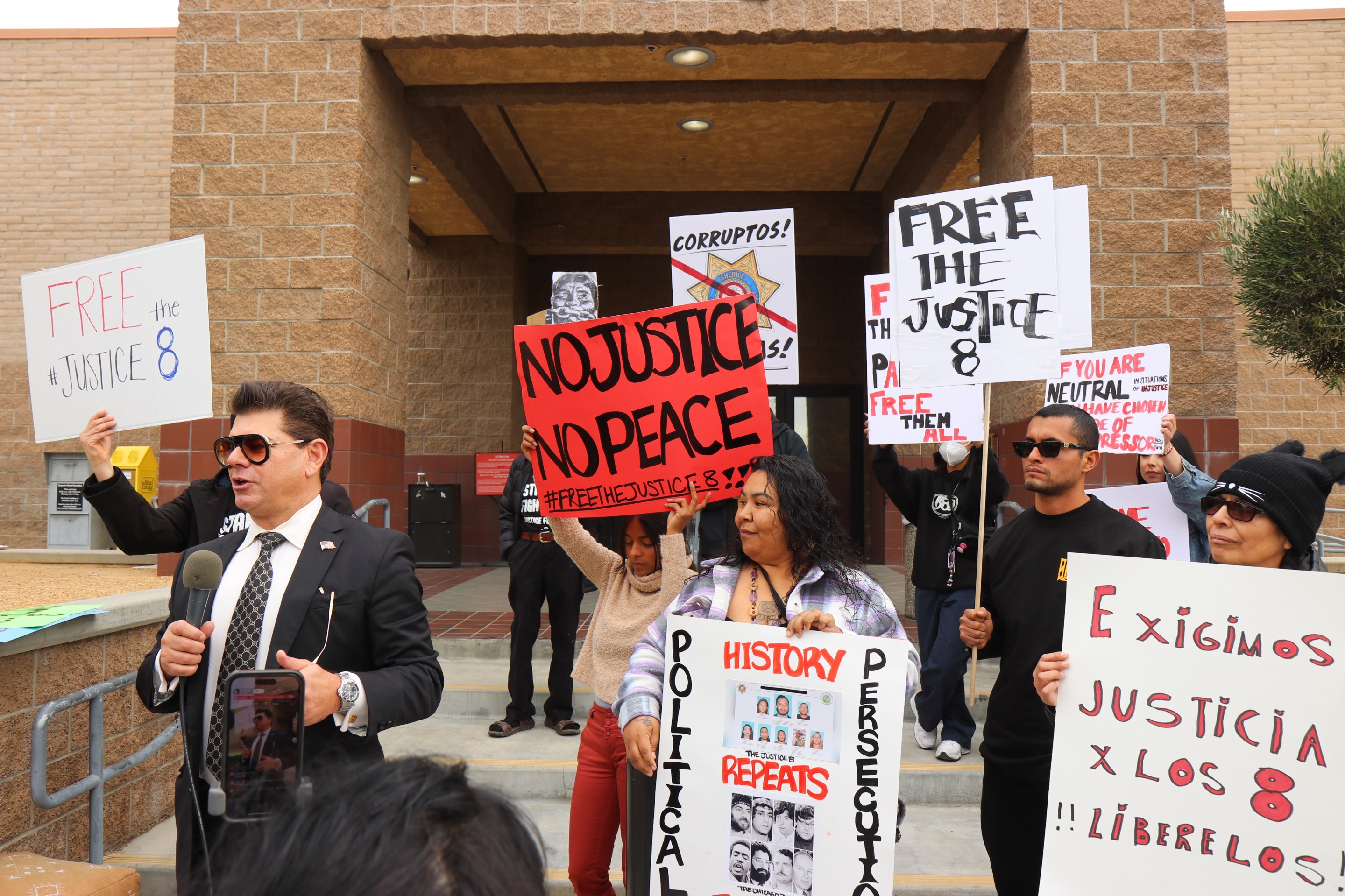The seven remaining street vendor activists who were arrested last December in their homes by the San Bernardino County Sheriff's Department are once again awaiting a judge's ruling, as their last effort to be granted bail takes place.
Last Friday, January 26, the bail hearing for the street vendor activists known as the "Justice 8" continued, with John Richardson, the deputy district attorney, closing out his arguments on why he believed the defendants should not be granted bail.
Richardson summed up his final arguments in a little less than an hour, in which he repeated much of his statements from previous bail hearings, including revisiting details in the three incidents that involve all three "John Does," the alleged victims of the incidents.
He was also adamant about telling the judge, John Wilkerson, his opinion that the defendants are considered a flight risk and a danger to the public. He also stated a concern for the alleged victims and any potential harm that may come to them if the defendants were released.
Richardson claims the defendants had “sophisticated means to locating their victims,” and referenced the John Doe #2 incident, in which Enamorado, while live streaming, called on his followers to go to Doe #2’s house. He alleges that the group used “online data” to locate Doe #2’s residence.
However, Enamorado’s attorney, Nicholas Rosenberg, argued with Richardson’s statement, explaining how it was proven, based on the evidence presented, that Doe #2’s residence was not located with online data, pointing out that the alleged victim lived right down the street from the police station.
“The reason they knew where John Doe #2 lived was because some guy came up to them and said he knew where he lived,” said Rosenberg outside the courtroom. “Even then, the judge pointed out that John Doe #2 was the guy who lived near the police station, there was no online data retrieved.”
The district attorney also suggested that the court cannot guarantee that the defendants will follow any rules applied to them should they be let out on bail. He claimed that, even with ankle monitors and other restrictions, there would be no way for the court to monitor their social media usage.
He then proceeded and said that the prosecution possessed proof that the defendants "can't follow rules," even while in jail. Richardson disclosed that Enamorado and his partner, Wendy Lujan, allegedly “violated jail rules” by setting up a three-way call to be able to talk to each other.
This supposedly resulted in both defendants being sent to “the hole,” another name for solitary confinement for the imprisoned. This means that Enamorado is currently confined to a 4-foot-by-8-foot cell, where he spends 23 hours inside and is only let out for one hour each day. Legislation was recently introduced in the U.S. Senate to end the practice, which has been found to cause potential long-term damage to inmates.
“To my knowledge, there was no court order prohibiting any of the defendants from speaking to each other,” said Rosenberg on Friday. “So they’re in the hole for something they did not know they were not supposed to do."
Richardson did not disclose what Enamorado and Lujan spoke about on the phone, but supporters argue that they are raising children together and have bills to pay at their respective homes. So having a need to speak with one another is by no means unusual.
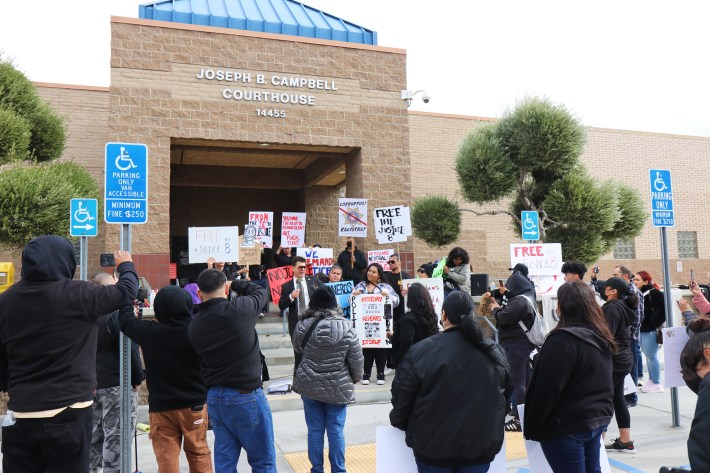
Richardson also brought up a statement made by defendant Vanessa Carrasco’s attorney, Damon Alimouri, at the last court hearing, in which he referenced the case of a 39-year-old tattoo artist named Christopher Abrian Zamora, who was arrested for sexual assault on a child. Alimouri stated that Zamora was granted bail the same day that Lujan was denied bail in the same court.
“How do you justify giving a child molester money bail, but these folks, even assuming everything they're charged with is true, why do they get no bail? Are they concerned more about what these folks do than what the child molester does?” said Alimouri two weeks ago.
Richardson argued that they had asked for no bail on that case, but that the judge ultimately ruled to grant bail to the sex offender who was accused of raping a minor.
Supporters of the activists were shocked to hear about the Zamora case, which was brought to the attorney's attention by Sennett Devermont, better known as Mr. Checkpoint on Instagram. Devermont found out about Zamora while researching information online. Devermont is known for filming and holding law enforcement accountable via his social media accounts, including one on YouTube.
In his research, Devermont found that not only was Zamora being accused of sexual assault of a minor but, in addition, there were 21 firearms found at his residence.
“They gave this guy bail; how are you not giving bail to an advocate of street vendors?," said Devermont outside the court. "It's disgusting. I think it’s clear retaliation and harassment. As an advocate and activist myself, it’s super worrisome what is happening. With the work I do, it’s hard not to see myself in them when they are up there.”
At Friday’s final bail hearing, supporters of the activists gathered outside the court with banners in hand that read “Free The Justice 8,” “Political Persecution,” and “History Repeats Itself,” with a photo of the Justice 8 at the top and a photo of the “Chicago 7” at the bottom.
Drawing a correlation to the Chicago 7 case, in which eight (later seven) activists were linked to protests against the Vietnam War that took place in response to the 1968 Democratic National Convention.
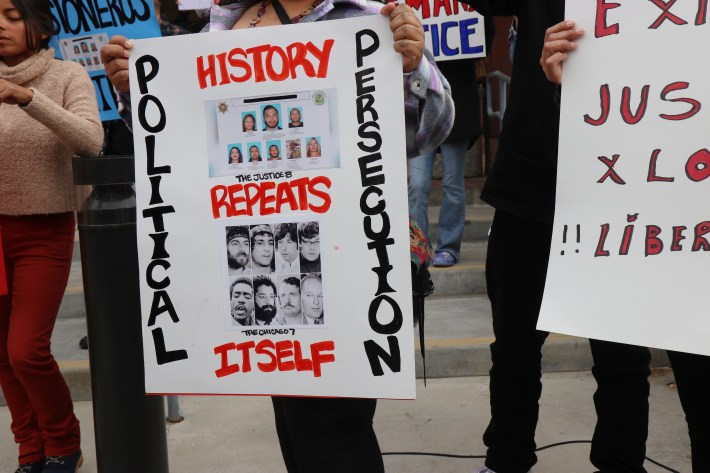
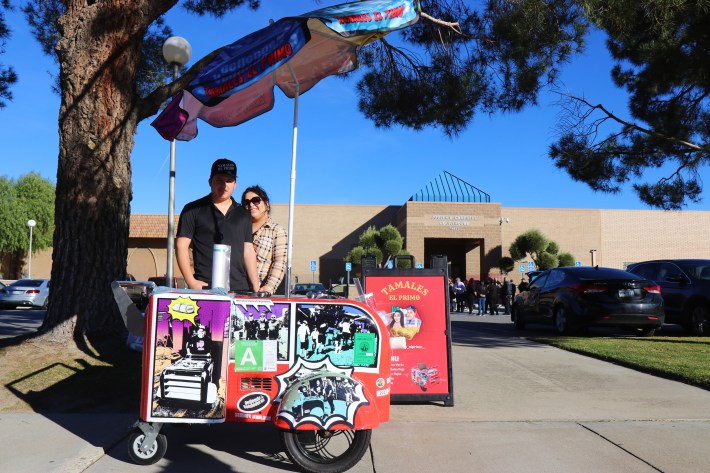
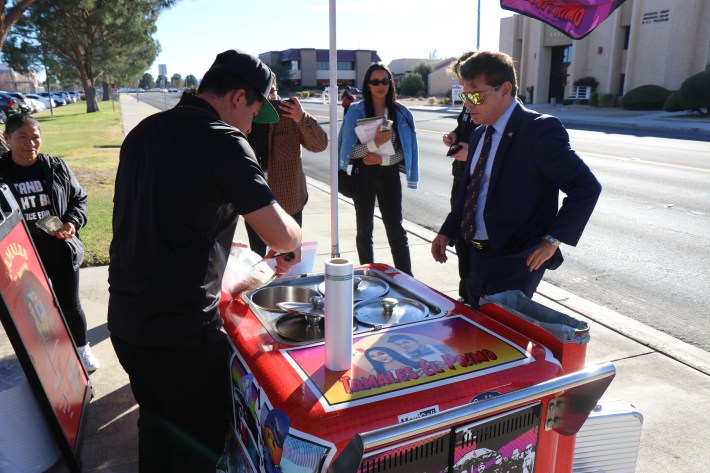
Among those supporting the seven activists in court were Luz and Juan Aguilar, owners of Tamales El Primo, a street vendor couple from San Pedro who, in 2022, were helped by Enamorado after Juan was verbally attacked by a man yelling racist slurs at him.
Enamorado organized a buy-out for the vendor, right in front of the man who accosted him. Supporters from all over Los Angeles showed up and the vendor was able to sell over 2,000 tamales that day.
Furthermore, Enamorado connected the vendors to Revolution Carts, the creators of the first-ever legal tamal cart in Los Angeles. The couple was donated a cart that was later featured at the Cheech Marin Museum and has helped the vendors reach stability.
The couple showed up on Friday to show solidarity with Enamorado. They brought their tamal cart and sold tamales outside the court to raise funds for The Justice 8.
“His help was super important to us, not just for me but for other street vendors he has helped too,” said Juan in Spanish. “I work so much better with my tamal cart.”
“A lot of people think he does it just for videos and views but no, Edin takes time out of his day to help us and walk us through everything,” added Luz. “We work now outside a Home Depot in Lakewood. He brought us peace of mind with his help.”
Last Friday’s bail hearing did not end with a final ruling. Judge John Wilkerson stated that he would take a few days to review everything before making his decision.
He set the next court date for February 9th, but clarified that his ruling may be sent to the attorneys before the set court date. Should the judge deny them bail, the activists will stay in custody throughout their trial, which is set to begin in early March.
The activists face charges including, but not limited to, conspiracy, assault, kidnapping, and false imprisonment. Enamorado's attorney has not confirmed with L.A. TACO on how many years Enamorado is facing for these alleged crimes.
“We still have some rights under the United States Constitution, you have the right to bail under the 8th Amendment," said Alimouri. "But for some reason, these folks don't get that right, that right has been violated. Why?”
